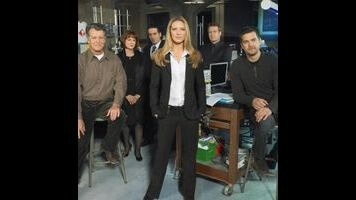Fringe: “The Human Kind”

The Matrix-ization of Fringe continues apace with the introduction this week of Jill Scott as Simone, a sort of “oracle,” who gets psychic flashes when she’s near Olivia. But Fringe uses Simone in its own Fringe-specific way, to contrast her way of seeing the future with the way that the Observer version of Peter predicts what’s going to happen. The title of this episode is “The Human Kind,” and that’s what Simone’s all about. She feels; she intuits. “The heart will make sense of what the mind cannot,” Simone tells Olivia. But Olivia’s not buying it. A half-decade of cracking Fringe Division cases has taught her that there’s an explanation for even the strangest phenomena, and that anyone who looks to “the heart” or “God” for that explanation is trying too hard to ascribe meaning that isn’t there. “It’s all just numbers,” Olivia tells Simone. And The Observers are “better at math.”
Science-fiction fans often get anxious when a story starts venturing too far into the realm of emotions and faith, and I can understand why. Writers love to play the “love” card, because it seems like an unbeatable trump—it can resolve dilemmas, and force deeper feelings into the plot. But audiences are more skeptical of it, for the same reasons. Imagine you’re playing poker and have a natural flush in your hand, only to get beat by an opponent who has a full house cobbled together from wild cards. That’s kind of what it’s like whenever you’re enjoying an intense, complicated narrative and suddenly all the complications are overcome because the hero just “believes” or “feels.”
There are ways to handle this kind of development adeptly though, and while the Fringe writers may ultimately end the series by going to this well once too often—and while certainly last season’s finale gives fans reasons to be wary in that regard—I have to say that the emotional payoff to “The Human Kind” works, and works splendidly. Maybe that’s because this whole last season has taken the “what it means to be human” theme that’s always been at the core of Fringe, and has elevated it to the surface, giving it some intellectual depth in the process. Our heroes are trying to save the future for mankind, which is only a meaningful goal if they have an understanding of what mankind is supposed to be. Is it to be like Walter, whose natural tendency is toward an all-consuming ambition? Or Peter, so driven to prove himself that he loses touch with why he’s doing it? Or Olivia, who’s trained her whole life to be hard, and is terrified that making too strong an emotional connection will weaken her? Let’s face it: This is a motley bunch, humanity-wise. So the fact that they’re trying so hard to get this right? It’s touching.
The other reason that “The Human Kind” is so successful is that each individual plot point and character beat that leads up to the big tearjerker finish is well-honed. Olivia meets Simone because one of Past Walter’s tapes sends her up to Fitchburg, to retrieve an electro-magnet that has been waiting for 21 years, since Simone was a girl, when an unnamed gray-haired man visited Simone’s mother. But Olivia is wary of Simone’s almost evangelical zeal about her arrival, and draws a gun on Simone, just in case she’s being set up by bounty hunters. So Simone frames Olivia’s situation well, telling her that she can leave and come back later with backup to get the truck, or she can show a little trust, like a human being.
 Keep scrolling for more great stories.
Keep scrolling for more great stories.
